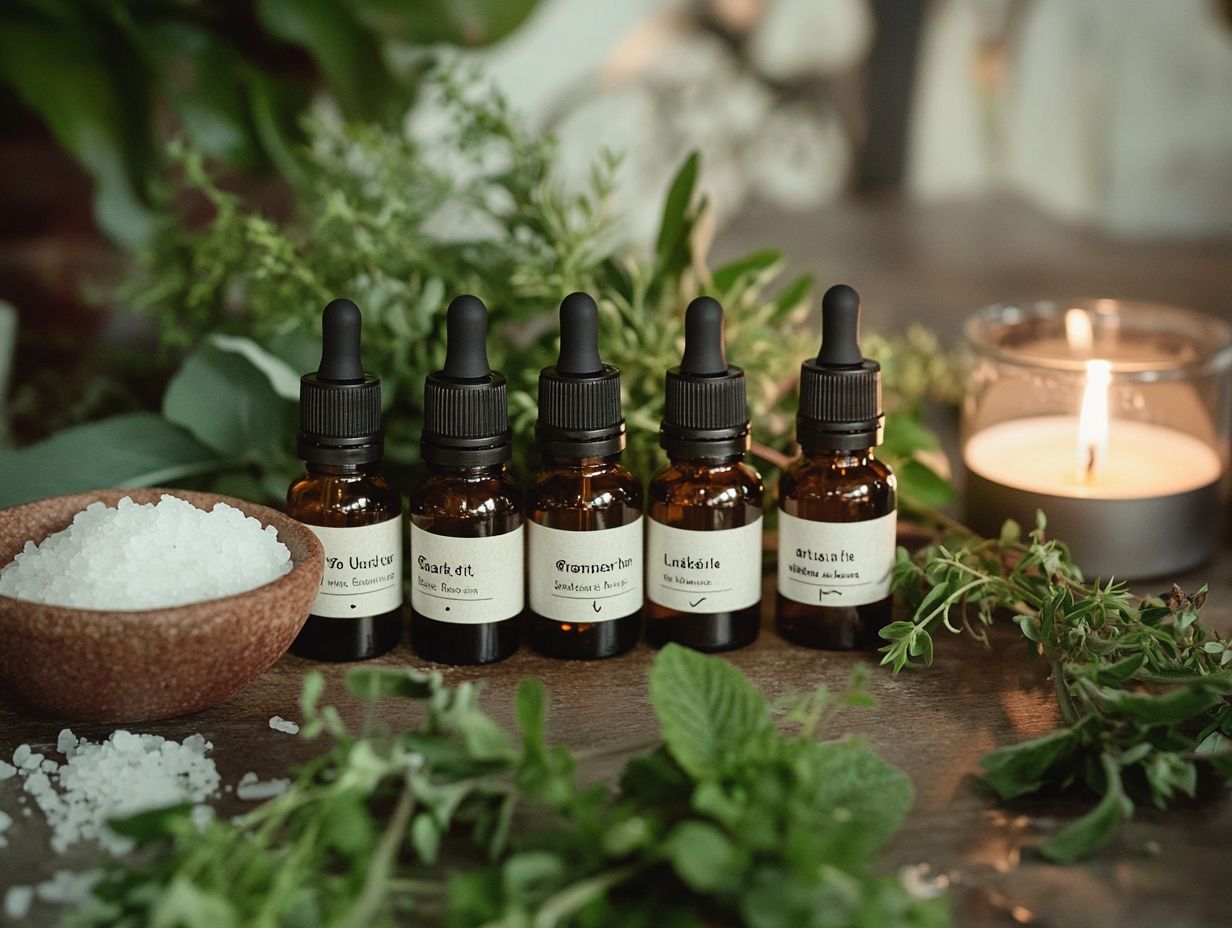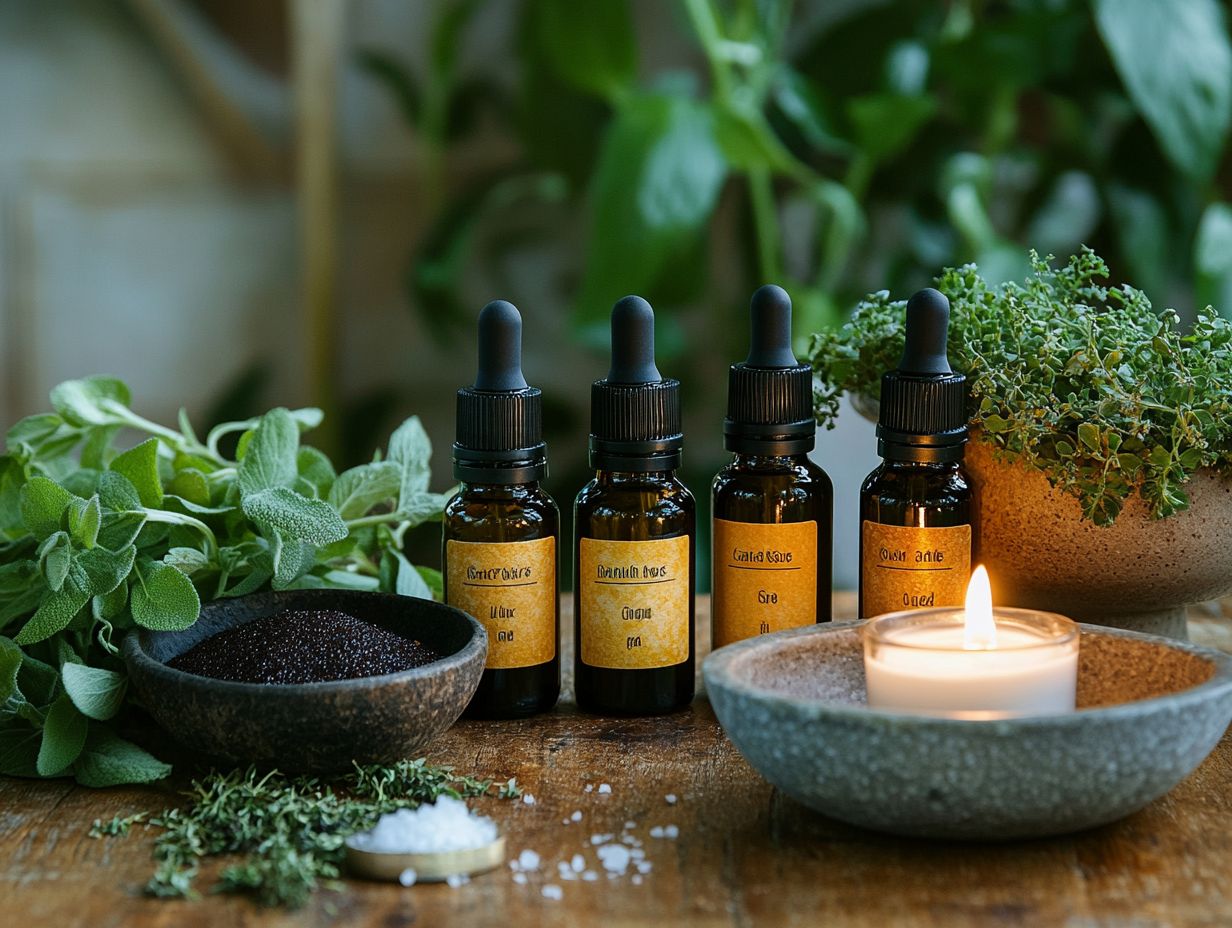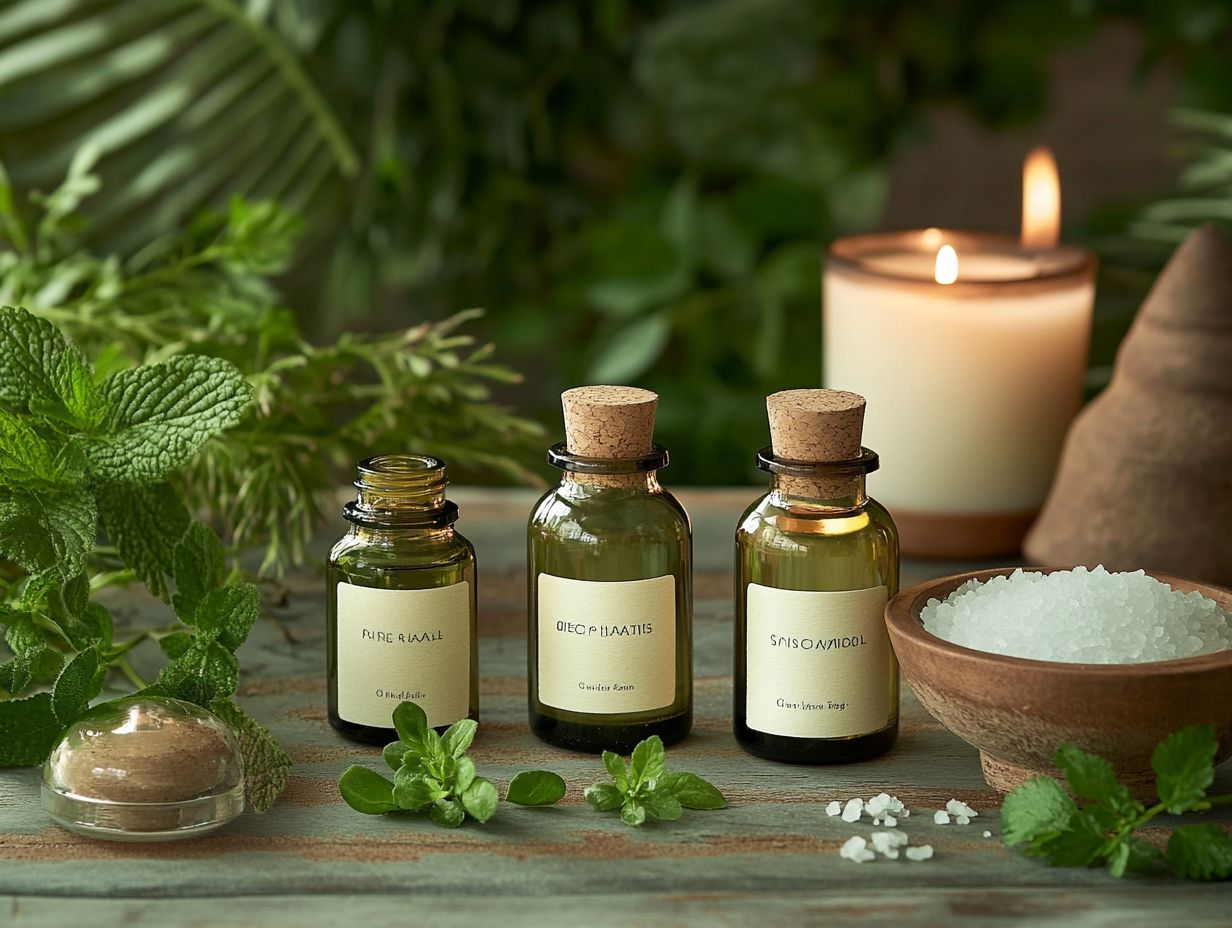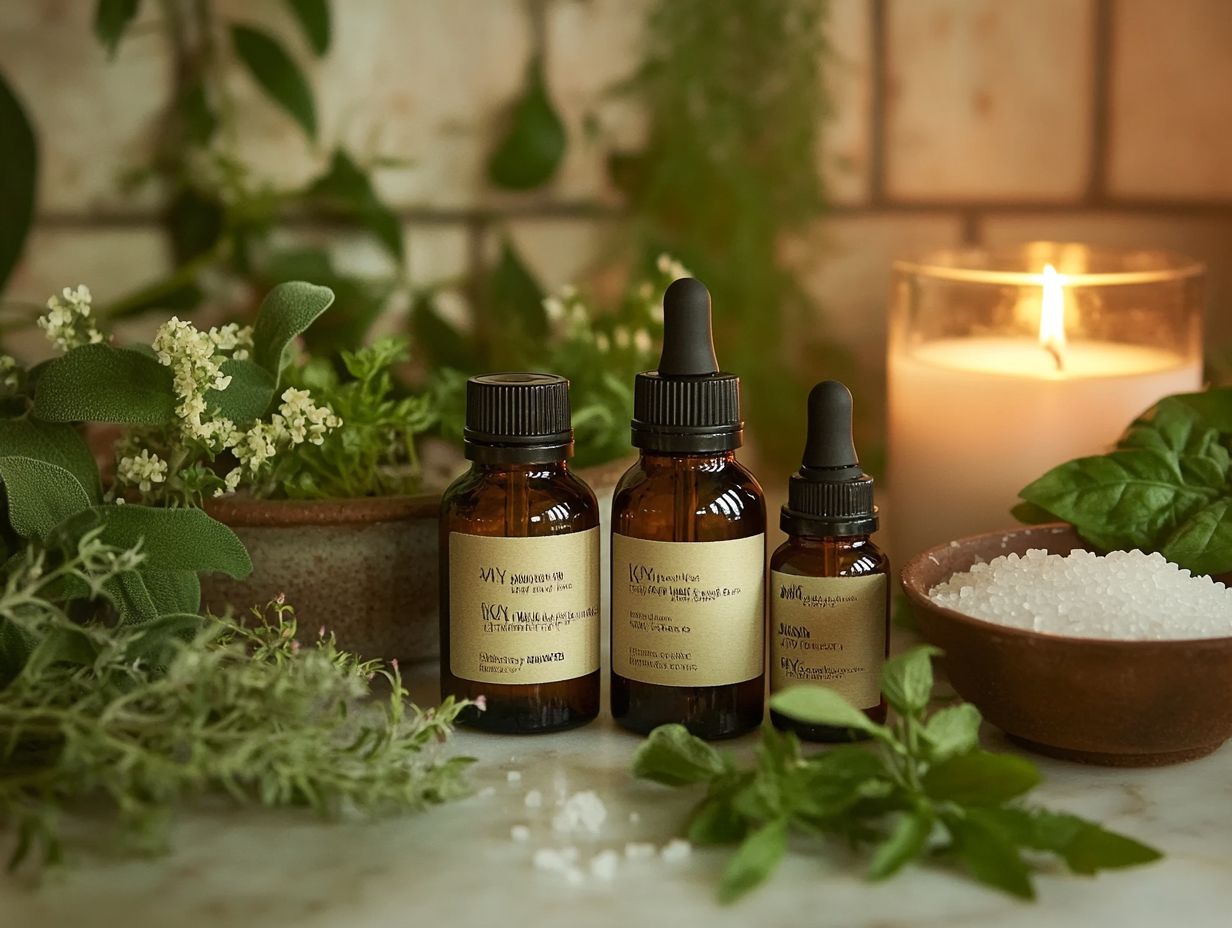5 Essential Oils for Stress Relief
In today s fast-paced world, chronic stress can often seem like an unrelenting force. Fortunately, nature provides powerful ways to help you relax and alleviate anxiety symptoms, with essential oils standing out as particularly effective natural remedies.
This article delves into five calming essential oils Lavender, Peppermint, Bergamot, Chamomile, and Ylang Ylang that can help cultivate a peaceful atmosphere in your life. You ll uncover various relaxation techniques to utilize these oils, explore essential safety tips, and learn about their additional health benefits.
By incorporating them into your daily self-care routine, you can achieve optimal stress relief, mood improvement, and restore a sense of emotional balance.
Contents
Key Takeaways:

- Lavender oil is a versatile essential oil that can help alleviate stress through its calming and relaxing properties.
- Peppermint oil is great for reducing tension and promoting mental clarity, making it a great option for stress relief.
- Bergamot oil is known for its uplifting and mood-enhancing effects, making it a perfect choice for managing stress and anxiety.
1. Lavender Essential Oil
Lavender essential oil is renowned for its calming effects, making it an invaluable ally in your stress management and relaxation toolkit. Its soothing aroma not only promotes emotional well-being but also works wonders in alleviating anxiety symptoms, enhancing your overall quality of life and providing relief from insomnia.
Research, including studies published in the International Journal of Nursing Practice, underscores lavender’s therapeutic benefits across various aromatherapy applications.
When you weave lavender oil into your daily routine, you create precious moments of tranquility amid your busy life. Imagine diffusing its calming scent in your living spaces, adding a few drops to your bathwater, or incorporating it into your massage oil. Each of these practices allows you to fully immerse yourself in lavender’s soothing embrace.
Studies have shown that inhaling lavender can lower heart rates and reduce stress in both humans and animals. Many users report a significant enhancement in their ability to unwind after a long, hectic day.
By pairing lavender oil with mindfulness exercises like meditation or deep-breathing techniques, you can amplify its anxiety-relieving powers, creating a holistic approach to your emotional wellness.
2. Peppermint Essential Oil
Peppermint essential oil is truly a gem in the world of aromatherapy, renowned for its invigorating aroma that not only sharpens mental clarity but also serves as an effective ally for stress relief and anxiety relief.
If you find yourself struggling with focus, the refreshing scent of peppermint can be your uplifting companion, clearing the mind and elevating the spirit. For those who experience tension headaches, the cooling properties of peppermint oil can offer considerable relief, whether inhaled deeply or applied topically. Experience the remarkable benefits of peppermint oil today and feel the difference!
When incorporating peppermint oil into your aromatherapy routine, remember to dilute it with a carrier oil which is a neutral oil that helps dilute essential oils for safe application like coconut or jojoba before applying it to your skin. This essential step ensures your safety and enhances its soothing effects, allowing you to fully enjoy the myriad benefits without any irritation.
3. Bergamot Essential Oil
Bergamot essential oil, extracted from the peel of the Citrus bergamia fruit, is celebrated for its remarkable ability to elevate mood and provide significant anxiety relief. It has rightfully earned its place as a favored choice in aromatherapy for achieving emotional balance. The scent and emotion connection is strong with bergamot, promoting positive feelings and mental clarity.
Research published in the Journal of Alternative and Complementary Medicine underscores how bergamot oil can effectively lower cortisol levels, promoting a sense of calm for those navigating stressful situations. If you re eager to harness its therapeutic benefits, consider blending bergamot with lavender or ylang-ylang. These combinations can enhance its soothing properties, creating an even more tranquil experience.
For optimal application, you might try the following methods:
- Add a few drops of bergamot oil to a diffuser for a fragrant ambiance.
- Create a calming massage oil by mixing it with a carrier oil (like coconut oil or jojoba oil).
- Indulge in its soothing effects by adding it to a warm bath.
Such practices not only foster relaxation but also support your emotional well-being, inviting a serene state of mind into your daily routine.
4. Chamomile Oil

Chamomile oil, derived from the delicate flowers of the chamomile plant, provides soothing aromatherapy benefits that encourage relaxation. It helps to alleviate anxiety and enhance your emotional well-being, much like the calming effects of a warm cup of chamomile herbal tea.
Its strong ability to reduce stress hormone levels makes it excellent for stress management and reduction. This essential oil is renowned for its ability to calm both the mind and body, making it a prime choice for anyone looking to find relief from the stresses of daily life.
By incorporating chamomile oil into your self-care routines, you can immerse yourself in its profound tranquility during moments of mindfulness or meditation. Try blending chamomile oil with other calming essential oils like lavender for an even more relaxing experience!
Whether you choose to use it in a diffuser, add it to your bathwater, or mix it with a carrier oil for a soothing massage, the versatility of chamomile oil plays a crucial role in promoting overall well-being and reducing stress.
5. Ylang Ylang Oil
Ylang ylang oil is celebrated for its exquisite floral aroma, offering not just a delightful fragrance but also acting as a potent mood enhancer. It can elevate your emotional well-being and foster a sense of tranquility, making it an excellent addition to your stress management routines. It can also contribute to positive feelings and improve your overall quality of life.
You might discover that weaving ylang ylang into your daily practices can significantly uplift your mood and ease anxiety. Whether you choose to diffuse it in your space, indulge in a warm bath infused with its essence, or blend it with carrier oils for a calming massage, this essential oil s versatility positions it as a valuable companion for achieving emotional balance.
If you’re eager to amplify its calming effects, consider combining ylang ylang with lavender or bergamot. By integrating these practices into your daily life, you can effectively harness the therapeutic properties of ylang ylang oil and navigate stress with greater ease.
Don t wait! Start integrating these essential oils into your routine today and feel the difference in your stress levels!
How Do Essential Oils Help with Stress Relief?
Essential oils can play a pivotal role in your journey toward stress relief, thanks to their calming effects and therapeutic properties. They serve as valuable natural remedies within a holistic approach to emotional balance and mental health.
Mind-body techniques, such as using essential oils, can enhance relaxation response and overall well-being. This stress relief primarily stems from the mechanisms of the sense of smell and the profound interaction these oils have with your limbic system the part of the brain that controls emotions.
When you inhale the aroma of essential oils, the molecules travel through your nasal cavity and bind to receptors. This interaction activates the limbic system and induces feelings of calmness.
Take lavender oil, for instance. It has been extensively studied for its soothing effects, with research from the International Journal of Psychiatry in Clinical Practice demonstrating its effectiveness in reducing anxiety levels.
On the other hand, peppermint oil is celebrated for its invigorating properties. It can uplift your mood while decreasing mental fatigue, as highlighted in various clinical studies. Lemon essential oil is another great option, known for its refreshing scent and mood-boosting properties.
Such findings provide a robust scientific foundation for incorporating these oils into your daily stress management practices.
What Are the Different Ways to Use Essential Oils for Stress Relief?
There are numerous effective ways for you to harness the power of essential oils for stress relief. You can try diffusing calming scents, applying them topically with carrier oils, or seamlessly incorporating them into your self-care routine.
Using an aromatherapy diffuser is a practical way to create a serene environment through olfactory stimulation. One popular method is diffusing, where you blend essential oils with water and disperse the mixture into the air. This creates a soothing atmosphere that envelops you in tranquility.
For topical application, mix the essential oils with carrier oils think coconut or jojoba to ensure safe and effective contact with your skin. You can also elevate your relaxation game by adding essential oils to baths or massage blends, embracing a holistic approach to self-care.
Blending oils like lavender, bergamot, and ylang ylang can create powerful essential oil blends for various therapeutic effects. Don t skip the patch test it’s essential for a safe and enjoyable experience! Always perform a patch test on a small area of skin before fully applying any oils.
This little precaution helps you avoid unwanted reactions, ensuring your experience remains pleasant and calming.
What Are the Safety Precautions When Using Essential Oils?

Ensuring the safe usage of essential oils is paramount for effective stress management. By taking the right precautions such as performing a patch test and understanding dilution guidelines you can prevent any adverse reactions that might disrupt your peace.
Always refer to resources like Cathy Wong from Verywell Mind for expert advice on safe usage. In this regard, carrier oils are your best friends! They make concentrated essential oils safe and easy to apply.
Exercise caution and avoid ingestion unless explicitly recommended by a healthcare professional; certain oils can be toxic when swallowed. For instance, always follow guidelines for the safe usage of oils like frankincense, rose, vetiver, jasmine, and sandalwood.
Consulting with healthcare professionals before incorporating essential oils and natural remedies into your routine, especially if you have underlying health conditions or are pregnant, is invaluable.
Dedicating time to research individual oils, including their benefits and contraindications, will enable you to approach their therapeutic properties with responsibility and awareness. This ultimately enhances their potential for stress relief and improves your overall quality of life.
Other Benefits of Essential Oils
Beyond just relieving stress, essential oils provide a wealth of health benefits, including alleviating anxiety, enhancing your mood, and promoting overall emotional well-being. They truly are a versatile addition to any self-care routine, offering both therapeutic effects and relaxation techniques that support mental health.
Research shows that lavender and chamomile can greatly improve sleep quality. They encourage relaxation and help reduce insomnia symptoms.
Oils such as rosemary and peppermint are known for boosting focus and cognitive performance, making them favored by both students and professionals.
Aromatherapy oils like lemon essential oil and frankincense also promote emotional balance and mental clarity.
Incorporating these oils into your daily practices whether by diffusing them in your workspace or using them during meditation can lead to noticeable improvements in mental clarity and emotional stability. Regularly integrating essential oils into your life allows you to embrace a holistic approach to wellness and vitality that enriches your overall experience.
Experimenting with essential oil blends and mind-body techniques such as meditation or olfactory stimulation can significantly boost your mood and support emotional well-being.
Best Essential Oil Blends for Stress Relief
Combining essential oils into effective blends can truly amplify their calming effects, transforming them into a powerful ally for stress relief and mood enhancement in your scent therapy practices. Using essential oils like lavender essential oil, bergamot essential oil, and lemon essential oil creates unique and powerful blends for various techniques.
By thoughtfully selecting the right oils and blending them in suitable proportions, you have the opportunity to craft personalized recipes that soothe both the mind and body. A harmonious mix of lavender, bergamot, and ylang-ylang creates a delightful aroma while promoting relaxation. These essential oil blends can be used in an aromatherapy diffuser to maximize their calming scents and therapeutic benefits.
A tried-and-true recipe might include:
- 4 drops of lavender
- 3 drops of bergamot
- 2 drops of ylang-ylang
These oils work in perfect harmony to alleviate anxiety and ease tension. Lavender is renowned for its calming properties, bergamot introduces an uplifting note to elevate your mood, and ylang-ylang adds a sweet floral scent that enhances emotional balance. Incorporating citrus bergamia (bergamot) and cymbopogon citratus (lemongrass) can provide additional positive feelings and mental health benefits.
Explore different combinations and create your unique blends! Experimenting can lead you to discover personalized recipes tailored to your needs, ultimately supporting your journey in stress management.
How Can Essential Oils Be Incorporated into a Daily Self-Care Routine?
Incorporating essential oils into your daily self-care routine can profoundly enhance your stress management practices and foster emotional well-being, guiding you toward a more balanced life. Regular use of these oils can help mitigate anxiety symptoms and reduce chronic stress over time.
Start your day by infusing your morning rituals with aromatic delights! Adding a few drops of invigorating citrus oil or lemon essential oil to your shower can truly kickstart your day with a burst of renewed energy and positive feelings.
As the evening unfolds and you seek moments of unwinding, consider employing calming lavender or chamomile in a diffuser while you read or meditate. This creates a serene atmosphere, allowing the stresses of the day to gently fade away. These calming scents can effectively trigger a relaxation response that supports both mental and physical health.
Set aside specific times for stress-relieving activities during your day like that mid-afternoon break where a dab of peppermint oil can revitalize your focus. Drinking herbal tea infused with essential oils can also enhance these sessions, offering further relaxation and stress reduction benefits.
Feel free to experiment with different oils and blends to find what works best for you, ensuring that every moment feels uniquely tailored and rejuvenating. Remember to do a patch test first to ensure the oils are safe for you.
Frequently Asked Questions

What are 5 essential oils for stress relief?
The 5 essential oils for stress relief are lavender, chamomile, bergamot, ylang-ylang, and peppermint. These oils can be particularly effective for anxiety relief and improving emotional well-being.
How does lavender oil help with stress relief?
Lavender oil has a calming and soothing scent that can help reduce feelings of anxiety, stress, and promote relaxation. The therapeutic effects of lavender essential oil are well-documented in journals such as the International Journal of Nursing Practice and Phytotherapy Research.
Can chamomile oil be used for stress relief?
Yes, chamomile oil is known for its calming properties and can be used to ease tension, anxiety, and promote better sleep. Chamomile oil is particularly effective in reducing stress hormone levels and is often included in essential oil blends for its soothing effects.
What is the best way to use bergamot oil for stress relief?
Bergamot oil can be used in a diffuser, added to a warm bath, or diluted with a carrier oil and applied topically to the skin for stress relief. Bergamot essential oil, derived from Citrus bergamia, can also be used in aromatherapy for mood improvement and anxiety disorder management.
How does ylang-ylang oil promote stress relief?
Ylang-ylang oil has a sweet and floral scent that can help reduce mental and emotional stress, promote relaxation, and improve mood. The calming effects of ylang-ylang can be especially beneficial for those dealing with chronic stress and anxiety symptoms.
Can peppermint oil be used for stress relief?
Yes, peppermint oil has a refreshing and invigorating scent that can help reduce tension headaches, improve mental clarity, and promote relaxation. As highlighted by experts like Cathy Wong from Verywell Mind, peppermint oil’s olfactory stimulation can also support stress reduction and positive emotions.






